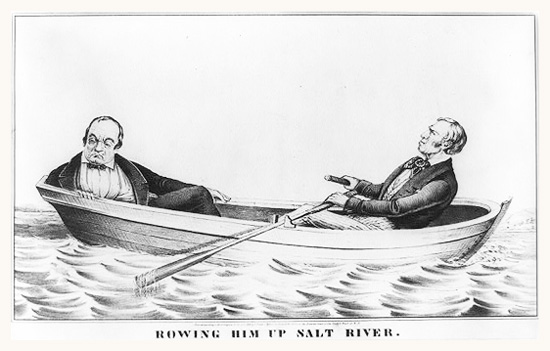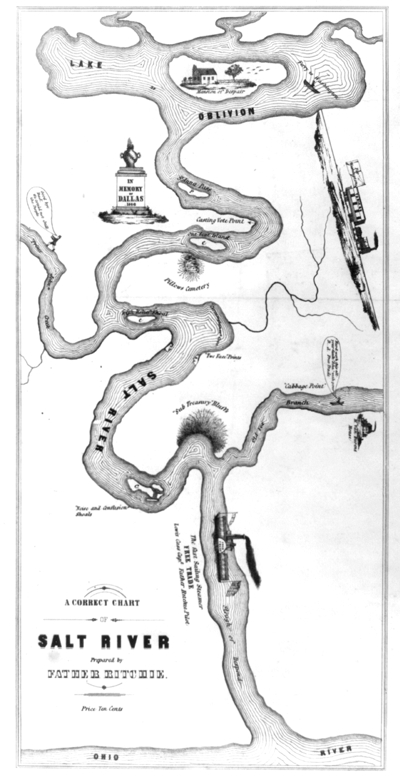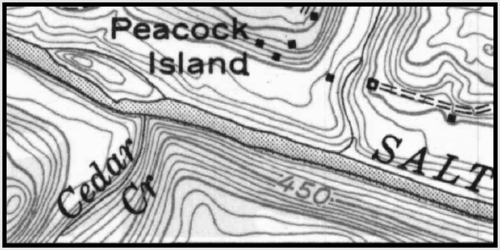
The following article by Charles Hartley was originally published on 21 Mar 2012. It has been revised with additional information, and new theories on the origin of this saying; and re-published in The Pioneer News on 11 Dec 2023.
Well, did your favorite politician get rowed up Salt River in the recent election? For those of you unfamiliar with this expression, it dates back nearly two centuries and has come to refer to politicians who lost their bids for office.
The earliest reference I've yet found to the expression was printed in The National Gazette on 7 Feb 1828 where South Carolina Representative James Hamilton used it in reference to Secretary of State Henry Clay when he was quoted as saying, "as they say in Kentucky, 'row him up Salt River.'"
The 1824 presidential election candidates had included John Quincy Adams, Andrew Jackson, Henry Clay, and William Crawford. When none of them received a majority of the electoral votes, it was up to the House of Representatives to choose a winner. The electoral count was Jackson - 99, Adams - 84, Crawford - 41, and Clay - 37. However, Clay threw his support to Adams, and he received the votes of 13 of the 24 current states, giving him a majority and the election.
When Adams then appointed Clay as his Secretary of State, the Jackson supporters cried it a "corrupt bargain," and used this as a campaign tool in the upcoming 1828 election.
The York (Pennsylvania) Gazette, while commenting in September 1828 regarding the upcoming race between President Adams and General Jackson, wrote that Jackson would "go with the current, while his opponent will, as the phrase is in Kentucky, be rowed up Salt River."
Then the following January, an Ohio paper that supported the defeated Adams wrote, "the Jackson men have beat us horse, foot and dragoons, and Kentucky is following in her train. We have no hope left; they have rowed us up Salt River."
The most frequently mentioned explanation for the "up Salt River" expression mistakenly attributes it to the 1832 election when Jackson easily defeated Clay.
In this explanation, Clay was said to have had an engagement to speak in Louisville, and employed a boatman to row up the Ohio. The boatman, who was a Jackson Democrat, pretended to miss his way, and rowed Clay up Salt River instead, so that he didn't reach his destination until the day after the election, just in time to hear of his defeat.
Another description of the phrase appeared in the Louisville Advertiser, as reprinted in the Salem Gazette of Massachusetts on 27 Jan 1835.

"Salt River is a small stream in this State, which empties into the Ohio River about twenty miles below this city. In the neighborhood of Shepherdsville, where the phrase of 'rowing up Salt river' originated, it is filled with rapids, snags, rocks, and sandbars. Of course, the navigation is extremely difficult, and rowing up Salt River is a matter not to be sneezed at. The labor attending it was so well known to those residing in the vicinity, that it became common among them, whenever any one spoke of some very arduous undertaking, to tell him that he would find it harder than trying to row up Salt River. When some bully had received a sound whipping, it also became common to say that he had been 'rowed up Salt River,' and the same remark was likewise applied to a defeated political party. If the defeat was overwhelming, they were said to be 'rowed very far up Salt River.'"

Then in 1848, with Zachary Taylor and Lewis Cass running for president, Nathaniel Currier drew the cartoon you see here depicting Taylor rowing Cass up Salt River. Cass, seated in the stern, wears an almost comical frown, and Taylor, plying his oars in the bow, a look of determination. This is just one of many such drawings depicting various politicians dealing with the perils of Salt River.
Another one, also shown here, shows a cartoonist's imaginary river yet to be traveled by Cass and his political friends.
Another story, printed in The Courier-Journal in 1880, was that the phrase originated at West Point, Kentucky. The story was that a hot race for county sheriff came along in Hardin County and two rival candidates agreed the defeated candidate would row the other from mouth to head of Salt River. He kept his word and rowed his successful competitor to the head of the river and it was the talk of the county for years after, especially during elections, and it spread all over the Union.
Still another explanation for the phrase appeared in the March 1891 issue of the journal, The American Teacher. Here was told the story of the local postmaster at Pitts Point who received an inquiry from the Postmaster General during the Jackson administration who wanted to know where the Salt River flowed into the Ohio. He phrased his question thus: "Where does Salt River run up?" The local postmaster replied in a curt note, "Salt River does not run up; it runs down." By return mail he was informed that his services were no longer required. When someone inquired of a local wag what had become of the postmaster, the reply was that his boss had sent him "up Salt River."
And another description was found in The Courier-Journal, in their issue of 12 Jan 1905. According to it, "In the early days of the last century, when Shepherdsville, the county seat of Bullitt county, which lies on its banks, was a place of considerable commercial importance from the manufacture of salt from the wells near by, a magistrate upon convicting persons of drunkenness and other offenses against good order, would sentence them to be 'rowed up Salt river.' From this the term came to be applied to unsuccessful candidates for political office, and was once current over the whole country. This is the true history of the saying. The river was in early days an important commercial stream, the products of the counties through which it runs, as whisky, corn, bacon, salt, etc., being sent down on tides, in flat boats, to the Ohio and thence to New Orleans. Perhaps it may never have the advantage of slack-water navigation. It may not be locked, but in a political sense it has been dammed for generations."
Lest you become confused by the allusions in the previous sentence, in 1903 a Corps of Engineers' report on the feasibility of making Salt River navigable upstream past Pitts Point toward Shepherdsville using a series of locks and dams was presented for consideration. It was determined that it was not economically feasible at that time.
The explanation of the origin of the expression "rowed up Salt River" that seems most likely, at least to me, was shared in The Frankfort Yeoman and reprinted on 2 May 1872 in the Mower County Transcript in Lansing, Minnesota. Here it is.
"The Frankfort Yeoman explains the slang phrase "rowed up Salt river" as having originated in the lynching of a till thief in Shepherdsville, Ky., on that classic stream. The detected thief, a broken down shoemaker, was "rowed up" the river to a small island at the junction of Jefferson and Nelson counties, before Bullitt was formed and which, by popular fiction, was believed exempt from State or local jurisdiction. Here the poor devil was whipped by each of the lynchers in turn with the injunction never to return. And "for many a day and year, when a man committed an act esteemed unworthy of himself or the community, the cry was "row him up Salt river."

This places the initial event sometime between 1793 when Shepherdsville was established, and 1797 when Bullitt became a county. And there just happens to be a small island, now called Peacock Island and shown on the topographic map insert here in the river upstream from Floyd's Fork, just where Cedar Creek empties into Salt River. With Salt River being the dividing line between Jefferson and Nelson counties at that time, it's just possible that some folks believed that the island was in neither county.
Regardless of its origins, the expression "rowed up Salt River" enjoyed popularity for perhaps a century or more by victorious politicians to the dismay of their opponents. And so now you know "the rest of the story."
Copyright 2023 by Charles Hartley, Shepherdsville KY. All rights are reserved. No part of the content of this page may be included in any format in any place without the written permission of the copyright holder.
The Bullitt County History Museum, a service of the Bullitt County Genealogical Society, is located in the county courthouse at 300 South Buckman Street (Highway 61) in Shepherdsville, Kentucky. The museum, along with its research room, is open 10 a.m. to 4 p.m. Monday through Friday. Saturday appointments are available by calling 502-921-0161 during our regular weekday hours. Admission is free. The museum, as part of the Bullitt County Genealogical Society, is a 501(c)3 tax exempt organization and is classified as a 509(a)2 public charity. Contributions and bequests are deductible under section 2055, 2106, or 2522 of the Internal Revenue Code. Page last modified: 12 Sep 2024 . Page URL: bullittcountyhistory.org/memories/upsaltriver.html